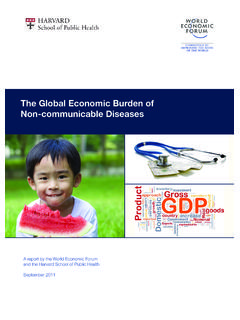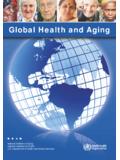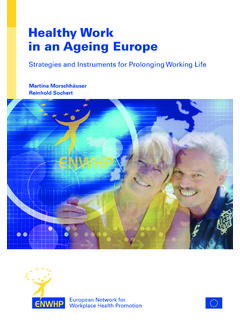Transcription of Ageing and Health Technical Report - WHO | World Health ...
1 WHO/ WHO Centre for Health Development Ageing and Health Technical Report Volume 5 A GLOSSARY OF TERMS FOR COMMUNITY Health CARE AND SERVICES FOR OLDER PERSONS World Health organization 2004 WHO/ A Glossary of Terms for Community Health Care and Services for Older Persons World Health organization 2004 All rights reserved. Requests for permission to reproduce or translate WHO publications whether for sale or for non-commercial distribution should be addressed to Publications, World Health organization , 20 Avenue Appia, 1211 Geneva 27, Switzerland (fax: +41 22 791 4806; email: or to the WHO Centre for Health Development, Centre Building, 9th Floor, 5-1, 1-chome, Wakinohama-Kaigandori, Chuo-ku, Kobe City, Hyogo Prefecture, 651-0073, Japan (fax: +81 78 230 3178.))
2 Email: The designations employed and the presentation of the material in this publication do not imply the expression of any opinion whatsoever on the part of the World Health organization concerning the legal status of any country, territory, city or area or of its authorities, or concerning the delimitation of its frontiers or boundaries. Dotted lines on maps represent approximate borderlines for which there may not yet be full agreement. The mention of specific companies or of certain manufacturers products does not imply that they are endorsed or recommended by the World Health organization in preference to others of a similar nature that are not mentioned. Errors and omissions excepted, the names of proprietary products are distinguished by initial capital letters. The World Health organization does not warrant that the information contained in this publication is complete and correct and shall not be liable for any damages incurred as a result of its use.
3 Printed in Japan. A Glossary of Terms for Community Health Care and Services for Older Persons Compiled by Professor Gary Andrews and Ms Debbie Faulkner, with assistance from Ms Melinda Andrews, Centre for Ageing Studies, University of South Australia, Australia, for the World Health organization Centre for Health Development (WHO Kobe Centre), Kobe, Japan. WHO Kobe Centre Project Officer Dr John G. Cai iii Preface The WHO Centre for Health Development (WHO Kobe Centre) is a research arm of the World Health organization based in Kobe, Japan, and has a global mandate to conduct research into the Health consequences of social, economic, environmental and technological change and their implications for Health policies.
4 Rapid population Ageing is undeniably exerting new pressures on existing Health systems. To be effective, Health systems, in considering the welfare needs of older persons and the social services for them, must respond in timely and creative ways to this global phenomenon and its Health and socioeconomic impacts. Today, providing adequate and cost-effective care for the growing number of older persons, their families and community involves and requires multisectoral and interdisciplinary integration and cooperation. But it poses challenges as well. While, on one hand, the heterogeneity of the Ageing and older population s Health status and welfare needs differ according to their cultural and socioeconomic settings, on the other, there is a lack of well-defined, standardized definitions and terminology for evaluation of diversified effective models.
5 This obstacle to cross-sectional dialogue and exchange of ideas and views is affecting policy formulation, research and education, as well as budgetary allocation to implement and deliver comprehensive and integrated services in a coherent manner. In recent years, the pressing need for standardization of terminology in community Health care for older persons has received increased attention from local and national governments, international agencies, NGOs, the scientific and service communities and the general public. In response to this need, the Ageing and Health Programme of the WHO Kobe Centre, in collaboration with the WHO Collaborating Centre for Population Ageing : Research, Education and Policy in Adelaide, Australia, initiated a project to develop an international glossary of terms applying to community Health care and services for older persons through consultation with global experts, both via the Internet and in face-to-face meetings.
6 This publication aims to define and standardize the basic concepts and functions of community Health care for older persons and organize them into a glossary, utilizing existing WHO definitions where appropriate, to promote a common language for cross-programme description and information dissemination. This glossary is the first step towards the pursuit of further collaboration in community Health care development. It is my pleasure, therefore, to release this document, entitled Glossary of terms for community Health care and services for older persons. I would also like to take this opportunity to thank all those who made valuable contributions to this important publication. I sincerely hope that it will be meaningful and useful in complementing the global work of WHO.
7 Dr Wilfried Kreisel, Director WHO Centre for Health Development Kobe, Japan v TABLE OF CONTENTS GUIDING CONCEPTS AND Health AND COMMUNITY CARE ADMINISTRATIVE, MANAGEMENT AND FINANCIAL STATISTICAL / RESEARCH TERMS IN COMMUNITY Health APPENDIX APPENDIX INTRODUCTION In recent years, the provision of adequate and cost-effective care for the rapidly increasing number of older persons in societies has received enhanced attention from national and local governments, international organizations, nongovernmental organizations (NGOs), and the scientific and service communities, as well as the general public.
8 Major issues concern the need for an integrated and more comprehensive approach towards meeting the special needs of older persons, their families and communities. This requires multisectoral and interdisciplinary cooperation. However, cross-sectional dialogue and exchange of ideas and views on policy formulation, research, education and budgetary allocation is being hampered by a lack of common or shared definitions and terminology. While a number of glossaries and dictionaries relating to Health and community care have been produced by various authorities in different constituencies, at present there is no internationally accepted common set of definitions for many of the relevant terms used to describe Health , Health care and services, including primary Health care and community Health care for older persons.
9 The WHO Kobe Centre International Meeting on Community Health Care for Older Persons in Urban Areas, held in Bangkok, Thailand, from 10 to 12 July 2001, identified a pressing need for standardization of terminology in community Health care for older persons and, as a major recommendation, proposed: Definition and standardization of basic concepts and functions and functions of community Health care for older persons into a glossary, utilizing existing WHO definitions where appropriate, in order to promote a common language for cross-city programme description and information dissemination. This glossary development will be the first step towards further collaboration 1. This project is the result of the WHO Kobe Centre s commitment to produce a glossary that, it is hoped, will facilitate international and within-country exchange in this important area.
10 As a first step, the glossary was constructed via a search of the literature. Where appropriate, existing WHO definitions have been included, but the glossary has been expanded by reference to a number of sources, as listed in the References. The second stage of the process involved professional review of the draft glossary. The aim of that review was to examine: the relevance of the terms included; the choice and arrangement of words and phrases for each term; and identification of terms not included in the draft. An invitation to comment on the draft glossary was sent to more than 100 individuals around the World who were identified as experts in the field of community Health care and services for older persons. Around one quarter (Appendix A) responded with comments about individual definitions and suggestions for additional terms.














